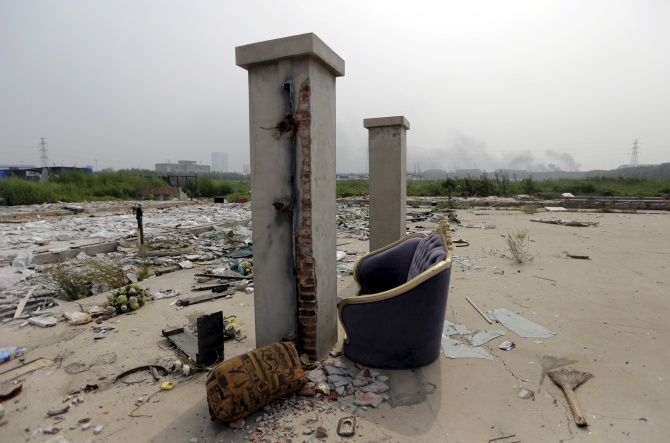
Over 1,000 firefighters aided by military experts trained in nuclear and biological warfare on Friday battled to put out flares emitting toxic fumes in north China as two fresh explosions struck this major port city after two massive blasts killed at least 56 people.
Fires are still burning at the site of the two massive explosions some 36 hours after the blasts as another 6,200 people were evacuated to prevent further casualties.
Aound 10,000 people were evacuated after the Wednesday blasts in a warehouse storing hazardous chemicals that sent fireballs, cars and containers shooting in the sky.

Smoke continued to billow out from the massive pile of hundreds of twisted and damaged containers as well as areas where large quantity of deadly toxic chemicals were piled up for exports before they were caught up in the explosions.
Officials said while they are using water to douse the fires in areas where hundreds of cars and large amount of tyres and plastic materials were stored, sand in large quantities is being used to put out the fires in places where chemicals were stored.
However, two minor explosions apparently caused by toxic materials on Friday occurred in the area where containers were piled up and authorities might also use sand to douse the fire in that area.

The death toll rose to 56, including 21 firemen, local officials said, adding that as many as 721 injured have been hospitalised, of whom 58 have sustained critical injuries.
The condition of 33 of them was serious, rescue headquarters said. In a silver lining to an otherwise grim day, a 19-year-old firefighter, Zhou Ti, was pulled out over 32 hours after blasts ravaged the areas.
More than 1,020 firefighters and 140 fire engines are still battling the raging fire, Zhou Tian, head of Tianjin's fire department at a press conference.
"When the blast occurred, several firefighters were working to put out the fire, and backup forces had just arrived. They were caught off guard, so the casualties are grave," he said.
He did not specify the number of missing firemen. However, Beijing News reported that 36 fire fighters are still missing.
"Forces from all sides are searching for the missing firefighters," he added.
So far, 33 people were rescued from the nearby areas, Zhou said, adding that firefighters have been directed to guard their own safety.
Besides trying to take control of the area, Chinese officials also battled speculation that foul air emanating from the contaminated area around the blast site is spreading into the Tianjin city, which has about 7.5 million pollution and also to Beijing as it is located just about 115 km close to the capital.

The rumours spread amid reports that hazardous substances have been detected from two drainage outlets near the blast site in Binhai New Area. Chemical oxygen demand and cyanide have been detected in the underground pipelines of blocked discharge outlets in the area affected by the Tianjin explosion, state-run china.org.cn reported, citing the ministry of environmental protection.
The ministry has conducted emergency rescue measures following the explosions.
“COD and cyanide have been detected in the underground pipelines of the two blocked discharge outlets in the accident area, with the excessive discharge three to eight times higher than the standard," the environmental department said.
It, however, added that the pollutants had not entered the surrounding environment to cause any pollution yet. The Beijing News reported that a factory owner said there were at least 700 tons of sodium cyanide stored in the warehouse, and traces of sodium cyanide were found in nearby drains after the blasts.
"The level of six chemicals in the five monitoring stations has not significantly risen, and is consistent with other parts of the city," Wen Wurui, head of the Tianjin environmental protection bureau told the media.
The six chemicals are sulfur dioxide, carbon monoxide, nitrogen oxides, epoxyethane, methylbenzene and volatile organic compounds. State-run CCTV reported the senior management of Ruihai International Logistics had been detained by authorities.
Meanwhile, the dangerous chemicals stored in the warehouses that exploded in China's TianjinPort cannot be identified at the moment, Chinese officials said. Officials tasked with marine monitoring announced that there were no hazardous chemicals detected in waters off the blast site in north China's port city Tianjin.
A statement from the State Oceanic Administration said major measurement of seawater composition did not show any anomaly compared with historical records, Xinhua reported.
Hazardous materials such as cyanide and volatile phenol were not detected, while the variety of zooplankton was not affected either, it said.
Air and water quality near the site of Wednesday night's blast are being closely monitored as conditions remain unclear. "So far, the air quality near the blast site remains
normal and will not have a harmful effect on residents," Feng Yinchang, an environmental expert, said at a press conference.
Some of the monitoring stations detected toluene, chloroform, methylbenzene and volatile organic compounds, all hazardous pollutants, between Wednesday night and Thursday noon, but their concentrations were decreasing because of wind blowing toward the sea, Feng said.
Questions are being raised on the firefighters' initial response of using water on the blaze that could have contributed to the blasts. Questions are also being raised whether the local officials followed rules permitting such hazardous materials close to population centres.
While Tianjin authorities on Thursday said a probe into the cause of the explosions is still underway, media have reported on questionable practices that may have worsened the disaster, including the company's previous environmental impact assessment, the warehouse's proximity to homes and Tianjin's city planning.

Residents living 500 to 2,000 metres from the area told state-run Global Times that they were not aware of dangerous chemicals in the warehouse, and did not receive any warnings when they bought their apartment.
"We thought it was a small fire in an ordinary warehouse when the blasts took place, and we did not pay much attention at first," a resident told the Global Times.
Gao Huaiyou, deputy director of Tianjin's work safety watchdog, cited major discrepancies between the accounts of company management and customs and damage to the company's office as reasons they are unable to identify the chemicals.
Cargo is stored in a warehouse for no more than 40 days before being transferred elsewhere, Gao told media. The environmental organisation Greenpeace Beijing expressed concerns over the health risks posed by certain chemicals after the two massive explosions rocked the area.
Greenpeace, citing information from Tianjin Tanggu Environmental Monitoring Station, said the company also stored calcium carbide in addition to the chemicals reported. It warned that chemicals are highly toxic and can present health threats both with short and long-term exposure.
Greenpeace also warned that rain could transfer air-borne pollutants into water systems as rain was forecast for the city. On Thursday, the Chinese army had deployed 217 military
specialists in nuclear and biochemical materials to Tianjin following explosions to deal with foul air as the warehouse where two explosions took place stored dangerous chemicals, cyanide and combustible materials.
The People's Liberation Army Beijing Military Area Command team, led by Deputy General Chief of Staff Wang Zhengrong went to Tianjin to study the conditions and asset the rescue teams.
Their deployment followed reports that the air in the Tianjin and surrounding areas has become foul with chemical smell after the explosions.











 © 2025
© 2025